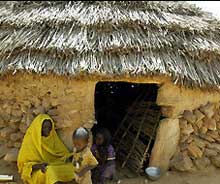|
No
Genocide In Darfur: EU Mission
 |
|
"We are not in the situation of genocide there... " Feith said
|
BRUSSELS,
August 10 (IslamOnline.net & News Agencies) – The European Union
said no evidence was found on genocide taking place in the Sudan's
western region of Darfur, though killings were committed on a wide
scale in the troubled area.
"We
are not in the situation of genocide there...But it is clear there is
widespread, silent and slow, killing going on, and village burning on
a fairly large scale," Pieter Feith, who visited Sudan on behalf
of the EU foreign affairs chief Javier Solana, leading an EU
fact-finding mission in the area, said Monday, August 9.
The
conclusion of the EU team put the European Union at odds with the
US Congress which adopted a resolution branding the
situation in Darfur as genocide against Darfuris of African origins.
On
Thursday, July 22, the US House Of Representatives unanimously passed
a resolution describing the situation in Darfur a
"genocide".
Feith,
however, cast doubts on Sudan's government efforts to offer protection
to civilians in the region.
"There
are considerable doubts as to the willingness of Sudan's government to
assume its duty to protect its civilian population against
attacks," he said.
Reports
about the number of victims of violence in Darfur vary deeply and
range from 10 to 50 thousand, and 2.2 million are reportedly in urgent
need of food, medicine and shelter, due to the attacks of the armed
militias on civilians in the area.
Dr.
Hussein Gezairy, Regional Director of World Health Organization’s
Eastern Mediterranean Region, told IslamOnline.net Thursday, July 29,
that the situation in the restive area did not amount to genocide or
ethnic cleansing as claimed.
Death
Toll Played Down
Meanwhile,
Sudanese Foreign Minister Mustafa Osman Ismail strongly disputed UN
figures on the number of dead in Darfur, saying they were up to 10
times too high.
Ismail
told a news conference in Cairo late Monday that according to
government estimates the 17-month conflict between Khartoum's forces
and its Arab militia allies and two main rebel groups in the region
had cost no more than 5,000 lives.
Of
these, 486 were policemen, Ismail asserted.
While
not denying Darfur is witnessing security, humanitarian and political
problem, Ismail said government forces moved into Darfur to assert
control, protect the people and head off a civil war, which had
threatened to engulf the region after the rebels took up arms and
began "terrorizing" the people.
"There
is a humanitarian, security and political problem in Darfur as a
result of the war," added Ismail, denying that the situation
amounted to "ethnic cleansing or genocide" of black African
communities by the Khartoum government, as suggested by certain
reports.
He
insisted that there was no need for an international peacekeeping
force in the region, saying deploying troops in Darfur could cause
friction with the local populations and the Sudanese military.
"We
do not have any problem with any number of observers or forces to
protect them," the Sudanese minister said.
Observers
could actually "contribute to confidence-building," he
added.
Adequate
Timeframe
 |
|
The EU team said there were abuses going on in Darfur
|
The
Arab foreign ministers had called Sunday, August 8 for giving the
Sudanese government an adequate timeframe to meet its commitments on
disarming militias in Darfur and tackling the humanitarian crisis in
the troubled area.
“The
Darfur crisis is very complicated,” the Egyptian foreign minister
Ahmed Abul Gheit said. “I cannot imagine that any country, even the
United States, can solve this crisis within 30 days.”
Arab
League Secretary General Amr Moussa also announced that the pan-Arab
organization had reached an agreement with the United Nations and the
Sudanese government to be part of a team monitoring Khartoum's
compliance with the UNSC resolution.
“Our
African countries that are members in the Arab League will participate
actively with the team monitoring the ceasefire, and perhaps, in an
African protection force,” Moussa said.
Sudan
and the United Nations had earlier drawn up an
action plan to rein in armed militias in the region and
facilitate the flow of humanitarian aid to the Darfur civilians.
Under
the deal, Khartoum agreed to facilitate the flow of humanitarian aid,
rein in the pro-government militias and begin negotiations with Darfur
rebels on ending the conflict.
The
two rebel movements, the Movement for Justice and Equality and the
Sudanese Liberation Army, have agreed to resume talks with Khartoum
August 23 in the Nigerian capital Abuja under AU auspices.
Last
Friday, the Security Council
adopted
a resolution threatening Khartoum with sanctions unless
the Sudanese government disarms armed militias, especially the
Janjaweed in Darfur within 30 days.
|